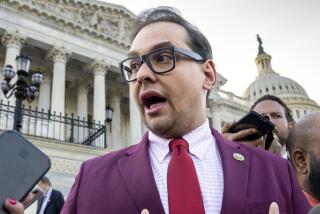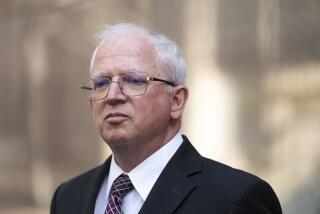Meese Opposition, Citing New Questions, Will Attack His Ethical, Legal Judgment
WASHINGTON — Atty. Gen.-designate Edwin Meese III’s opposition in the Senate, gearing up for a second round of confirmation hearings later this month, plans to use information developed by independent counsel Jacob A. Stein to argue that Meese lacks the ethical and legal judgment to fill the nation’s top law enforcement post.
Stein’s five-month inquiry concluded last September that there was “no basis” for prosecuting Meese, now counselor to President Reagan, on any criminal charge. Meese said at the time that Stein had “cleared the air.”
But Meese’s detractors contend that, far from exonerating Meese, the probe has raised serious new questions about how he handles financial matters, about his ability to recall crucial details of his personal and business dealings and about his credibility.
Stein Avoided Comment
Stein, they emphasize, deliberately avoided commenting on the propriety of Meese’s dealings, saying the independent counsel’s mandate did not permit him to make such judgments. “The fact that the special prosecutor found that Mr. Meese did not break any criminal laws hardly qualifies him to be attorney general,” said Howard M. Metzenbaum (D-Ohio), Meese’s chief antagonist on the Senate Judiciary Committee.
Metzenbaum, the only committee member publicly committed to opposing Meese’s confirmation when the hearings begin Jan. 29, declined to spell out his objections to Meese. But Democratic committee sources said Metzenbaum’s renewed attack will focus on:
--Meese’s disputed promotion to colonel in the Army Reserve.
--His acceptance of a $10,000 check for moving expenses and his subsequent testimony that he had not been reimbursed for the move.
--His inability to recall key conversations relating to potentially damaging information disclosed by Stein.
--His failure to comply with government financial disclosure forms.
--His role in recommending federal jobs for persons with whom he had financial relationships.
A spokesman for Meese, while saying that Meese prefers to deal with the questions when the new confirmation hearings begin, contended that Stein’s report showed “not only no legal wrongdoing, but no impropriety.”
“Our contention is that, to determine that there was no illegality, you had to determine there was no immoral conduct,” said the spokesman, who spoke on the condition that he not be identified. “Every issue turned on intent. The issues of illegality and intent were merged.”
Whatever Metzenbaum’s success in demonstrating that he is not merely rehashing allegations aired during Meese’s first set of hearings last March, the Ohio senator faces a decidedly uphill struggle in trying to block Meese from succeeding Atty. Gen. William French Smith.
Report Not Positive
No other Democratic member of the committee has indicated that he will actively support the effort, though Sen. Edward M. Kennedy (D-Mass.) says he will renew inquiries about Meese’s stands on civil rights issues.
And, while aides to some Republican committee members acknowledge that Stein’s report is not a positive argument for confirmation, they note that the Senate has rarely denied a President the Cabinet he wants at the start of a new term.
Moreover, Metzenbaum has faced ethical questions himself about a $250,000 finder’s fee he accepted in a real estate transaction and later returned. “I just don’t think it’s relevant,” he contends.
More to Read
Get the L.A. Times Politics newsletter
Deeply reported insights into legislation, politics and policy from Sacramento, Washington and beyond. In your inbox three times per week.
You may occasionally receive promotional content from the Los Angeles Times.










